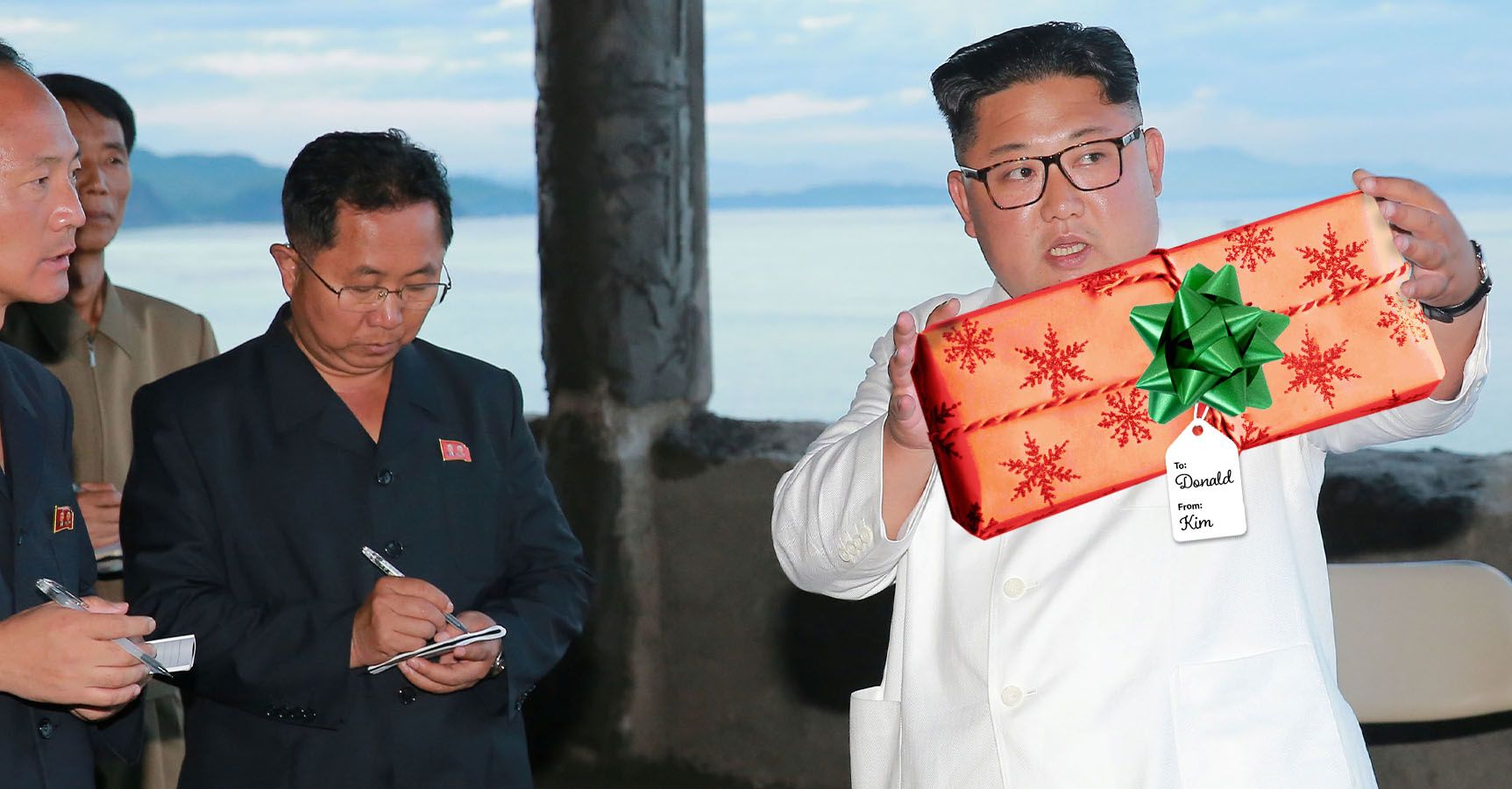December 23, 2019
North Koreans bearing gifts? – What kind of present will North Korean leader Kim Jong-Un leave under the tree for President Trump this year? US spooks are worried it could be a missile test: Talks over the North's nuclear arsenal have stalled since a summit between the two leaders broke down in February, leaving Pyongyang chafing under US sanctions. Testing a new ICBM that could reach the US would be one way for Kim to get Trump's attention, but it might provoke the US to seek even tighter financial curbs against the North. China, South Korea, and Japan have engaged in a flurry of diplomacy in recent days to try to tamp down rising tensions.
Turkey's refugee warning – Turkey's President Recep Tayyip Erdogan said over the weekend that more than 80,000 refugees from the Syrian province of Idlib had fled for the Turkish border amid bombing by the Assad regime and Russian forces – and that Turkey would not shoulder the full burden of accepting them. Under a deal with the EU, Turkey already hosts more than 3.7 million Syrian refugees, and public anger about it is rising. That's one reason Erdogan recently invaded northern Syria—to create a "safe zone" for the resettling of some of those people. He says that unless Europe backs his plans, he'll "open the gates" to allow millions more refugees to enter the EU.
West African countries cut a lingering colonial tie – For decades, former French colonies in Africa have used a common regional currency known as the CFA Franc. Over the weekend, eight of those countries in West Africa – Ivory Coast, Benin, Burkina Faso, Guinea-Bissau, Mali, Niger, Senegal, and Togo – agreed with France to rename the currency the "Eco" and to scrap the requirement that they keep half of their foreign reserves in this currency. The new currency will still be pegged to the Euro, as the CFA Franc was. We are watching to see what effect the change has on the economy and well-being of these countries' populations.
What We're Ignoring
A flimsy fall-guy verdict in Saudi Arabia – A court in Saudi Arabia convicted eight people in the 2018 murder of dissident journalist Jamal Khashoggi, and sentenced five of them to death. None of those people, of course, is Crown Prince Mohamed bin Salman -- whom Western intelligence agencies believe ordered or approved the killing – nor two of his top advisers who were believed to have intimate knowledge of its details. This is hardly surprising – Saudi Arabia's highly politicized judicial system was never expected to punish the country's de facto leader or his aides. Still, we are ignoring this verdict because, frankly, it's (M)B.S.More For You
Prime Minister Narendra Modi, with President of the European Council António Luís Santos da Costa, and President of the European Commission Ursula von der Leyen, at Hyderabad House, in New Delhi, India, on Jan. 27, 2026.
DPR PMO/ANI Photo
On Tuesday, the world’s largest single market and the world’s most populous country cinched a deal that will slash or reduce tariffs on the vast majority of the products they trade.
Most Popular
Sponsored posts
Five forces that shaped 2025
What's Good Wednesdays
What’s Good Wednesdays™, January 28, 2026
Mexican President Claudia Sheinbaum Pardo stands alongside Canadian Prime Minister Mark Carney and US President Donald Trump during the 2026 World Cup draw at the John F. Kennedy Center for the Performing Arts in Washington, D.C., on December 5, 2025.
Deccio Serrano/NurPhoto
Canadian Prime Minister Mark Carney has repeatedly tussled with US President Donald Trump, whereas Mexican President Claudia Sheinbaum has tried to placate him. The discrepancy raises questions about the best way to approach the US leader.
Fighters of the Qassam Brigades, the armed wing of the Palestinian Islamist Hamas movement, attend a rally marking the 35th anniversary of the group's foundation in Gaza City on December 14, 2022.
Photo by Majdi Fathi/NurPhoto
10,000: The number of Hamas officers that the militant group reportedly wants to incorporate into the US-backed Palestinian administration for Gaza, in the form of a police force.
Walmart is investing $350 billion in US manufacturing. Over two-thirds of the products Walmart buys are made, grown, or assembled in America, like healthy dried fruit from The Ugly Co. The sustainable fruit is sourced directly from fourth-generation farmers in Farmersville, California, and delivered to your neighborhood Walmart shelves. Discover how Walmart's investment is supporting communities and fueling jobs across the nation.
© 2025 GZERO Media. All Rights Reserved | A Eurasia Group media company.
